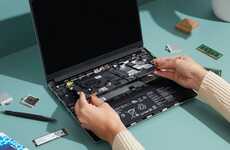
'BloLab' Teaches People How to Build Computers Out of Recycled Waste
Colin Smith — November 23, 2021 — Social Good
References: facebook & springwise
BloLab is a Benin-based startup that will teach people how to build recycled component computers for free. The process involves hosting free workshops on building computers for public attendance. The only caveat is that attendees will have to bring their own materials.
The resulting computers are named 'Jerry' because they are built out of old computer components and recycled jerrycans. Attendees can simply bring used jerrycans and old computers to the workshop and they will be walked through the process of building a fully operational computer.
BloLab believes that owning a computer is essential in the current world. The Jerry is meant to bring access to computers to individuals from all walks of life, opening up a great deal of opportunities for these individuals, all while performing a social good by recycling old waste products.
Image Credit: Shutterstock
The resulting computers are named 'Jerry' because they are built out of old computer components and recycled jerrycans. Attendees can simply bring used jerrycans and old computers to the workshop and they will be walked through the process of building a fully operational computer.
BloLab believes that owning a computer is essential in the current world. The Jerry is meant to bring access to computers to individuals from all walks of life, opening up a great deal of opportunities for these individuals, all while performing a social good by recycling old waste products.
Image Credit: Shutterstock
Trend Themes
1. Recycled Component Electronics - Opportunity to create workshops and provide instructions on how to build other electronics using recycled components to reduce e-waste.
2. DIY Electronic Assembly - Opportunity to offer DIY electronic assembly kits with recycled components as a more eco-friendly option for consumers.
3. Green Technology Education - Opportunity to educate and promote the benefits of green technology and sustainability through similar workshops on creating and using eco-friendly electronics.
Industry Implications
1. Education - Schools and universities could integrate similar workshops to teach students about sustainable electronic waste management and building eco-friendly electronics.
2. Manufacturing - Manufacturers can consider using recycled components and eco-friendly materials in their electronic products and packaging to capitalize on increasing consumer demand for sustainability.
3. Government - Governments can invest in similar initiatives to promote the adoption of sustainable practices and provide access to technology for marginalized communities.
3.6
Score
Popularity
Activity
Freshness
























